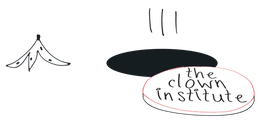|
In an era where individualism often overshadows communal bonds, the Clown Chorus Ensemble Lab held earlier this month in Sydney aimed to offer a refreshing perspective on the delicate balance between selfhood and collective identity. This lab didn’t just explore theatrical performance; it challenged our understanding of how unique individuals emerge from and contribute to the collective. The questions posed in this lab weren’t merely academic; they were deeply relevant to contemporary society in 2024. Redefining Heroism and Community Activist Emma Goldman's poignant challenge to "be oneself and yet in oneness with others" resonates profoundly in today's fragmented world. The Clown Chorus Ensemble Lab was an experiment in rediscovering this balance. By creating a collective flow (aka the chorus) only to intentionally disrupt it, we were able uncover the unique "clown" within each participant. This joyfool disruption isn't just theatrical; it’s a metaphor for societal change. Who is our Modern Hero? In our quest to identify modern heroes, the lab proposed that today's stereotypical heroes are not the traditional strongmen or flawless figures but those who, like clowns, embrace vulnerability and imperfection. They are individuals who can stand apart from the collective, question it, and yet remain an integral part of it. In this light, the clown becomes a symbol of resilience and truth in a world often obsessed with superficial perfection and lies. The lab's approach to building and breaking collective flow highlighted an essential truth: genuine progress often requires disruption. This perspective challenges the notion that harmony and conformity are always desirable. Instead, it suggests that the most profound truths and innovations emerge from the cracks in the collective facade. The clown, by daring to be different, exposes these cracks and invites us to confront uncomfortable realities.
Ethical and Universal Connections As I observed the lab participants in choral formation it reminded me of the power of communal performance. It’s not just about moving in sync; it’s about connecting deeply with others, society, and the universe. This connection is ethical in nature, urging us to be conscious of our movements and their impact on the collective. It’s a return to the roots of theatre, where the chorus was not just a group but a representation of societal conscience. Clown as a Mirror Naturally, the clown’s role in this lab was not merely to entertain but to act as a mirror to society. By embracing perceived inadequacies (cracks in our personas), the clown challenges the observer or audience to reconsider their definitions of normalcy, success and how one should behave. The clown’s perpetual rise after every fall is a poignant metaphor for resilience and the human spirit’s triumph over adversity. The clown teaches us that true bravery lies in the ability to rise repeatedly like the tallest sunflower. It’s not about wallowing in despair but about using it as a catalyst for creating meaningful connections and understanding. The clown, by existing within this tragic space, bridges the gap between individual pain and collective empathy. In the end, the two-day Clown Chorus Ensemble Lab was more than an artistic experiment; it was a call to action. In urging us to embrace our vulnerabilities, joyfully disrupt the status quo, and find the sweet spot in our collective humanity. By reimagining the roles of the clown and the chorus, maybe we can redefine heroism, adopt deeper connections, and create a more resilient and compassionate society. Who knows, perhaps in the laughter and tears shared through this journey we call life; we may find the true essence of what it means to be a funny old human.
0 Comments
Clowning is in the heart business, not only does it help heighten our immune system it can also make the heart stronger, plus the clown can touch our hearts too. A clown is to be your heart on stage, whether that be the stage of life or a theatre. Sometimes we go through experiences that feel too large or significant for words to fully capture, and that is where art, our hearts, and clowning becomes useful; we go to humour, symbols, and imagery to tell our stories. Isn't that wonderful? When I first set out to put together the Clown & Melodrama workshop back in late 2019, it was born out of curiosity and desire to express my despair and to find a playful way to transform that heartbreak into physical comedy. My questions were: what's the most fun way to create clown performances from these identifiable life moments and personal struggles, and secondly could these clown performances inspire laughter, hope, and healing in others?
In devising the workshop, I decided to review my time as a student at the Jacques Lecoq school, combining principles (or provocations) from subjects we learned like melodrama, tragic chorus, and clown. I wanted to understand how best to take an audience on a pathos-fuelled journey, via tears and laughter. I remembered the work we did in the first year exploring music and the counter mask where we moved the opposite way, or against the rhythm of a musical composition. As students writhing around to the music, we'd find an absurdity – a kind of sense in the nonsense. So, I mused why not apply this similar counter mask idea to create a clown logic that reverses the audience's expectations and that could potentially tug at the heart too. I found that we can take a very serious subject like the separation of a couple and observe how the clown subverts this situation by playing against it, by using an opposite expected rhythm. The improvisation plays out like this: The clown arrives home from a long day of work and hustling to find their spouse (played by an actor in realism) furiously packing and stuffing their personal belongings into a suitcase. The most obvious reaction is for the clown to play sadness or rage. This would be the boring choice and as the audience yes, we'd feel pity for the clown but would we be transformed, is this going to tickle our funny bone and make us love the clown? My guess is - not really. But what if the clown were to walk in, pause and observe their spouse packing, suddenly change their rhythm by excitedly grabbing their dusty suitcase, snorkel gear, and beach towel under the notion that they were together going on a romantic getaway. To add insult to injury, we then hear a knock at the door and the clown's spouse greets a stranger with a passionate embrace and kiss. The clown, stunned and wide-eyed now chooses an unexpected rhythm hurriedly walks up to the stranger shakes their hand, and offers them a generous tip, mistakenly believing the new lover is the cab driver that will drive them to the airport. It is 200% more fun and surprising for the clown, your scene partner, and the audience when we get to play against the obvious and alternate the expected rhythms. Here we can access vulnerable states, paradoxes, and reversal of order which benefits the clown enter into a playful tragic realm. It removes all sentimentality so it is the audience who does the work of feeling (the gooey heart stuff) and this can hopefully lead to transformation. What is the transformation? In this scenario it is about us, the audience, connecting to the fool's misunderstanding. Around the world, we're all fractured and socially disconnected. In clowning and clown training we can engage laughter and play in direct action towards social justice, to alleviate pain and suffering, and to remind us of our humanity. The clown's role in theatre or social contexts has become clearer to me over time; they're the guiding light of hope. They're the eternal dreamer showing us the way that with every human disaster there's an opportunity to create a space for connection, to experience empathy. The Clown and Melodrama workshop aims to access a playful dimension to our human tragedies. Day one of the workshop is focused on the journey of the emotions and opening the clown's heart first because before we can begin to perform 'heart surgery' on others to some degree we must be prepared to access our vulnerable states and stories first. Day two of the workshop is then dedicated to improvisation and games around how the clown can stay optimistic despite a terrible situation, as well as devising clown creations. It's easy to be playful and laugh when we are feeling good, but it is when the world seems bleak that we need to laugh the most in our lives. Our laughter then echoes in the chambers of our hearts, filling the empty spaces with pure joy and fun. Books
FilmsTVVideosSchoolsOrganisations
This is one of my all time fave quotes and moments in a film. It sums up for me the profound sentiment I have following a clown workshop; it’s a feeling of stupefaction and awe at each person’s capacity to share something usefool with the world. The Fool: I am ignorant, but I read books. You won't believe it, everything is useful... this pebble for instance. Gelsomina: Which one? The Fool: Anyone. It is useful. Gelsomina: What for? The Fool: For... I don't know. If I knew I'd be the Almighty, who knows all. When you are born and when you die... Who knows? I don't know for what this pebble is useful but it must be useful. For if its useless, everything is useless. So are the stars! - Excerpt from La Strada As I get ready to run a morning weekend clown workshop I watch new students roll in donning their adulthood overcoats. When they arrive some hang back politely happy to make small talk sharing timid smiles, there’s the slightly perplexed face of ‘somebody who doesn’t know’, and others who are excited raring to go.
One of my greatest pleasures is observing the loosening of the presentable and acceptable version of adulthood into disarming playfulness within minutes as we engage in one of our first games called ‘Soul Train’. Music is a fabulous motivator; I’ve seen some jaw-dropping situations. There are particular songs that transform us even if it is for just a moment – they can make us strong, brave, sexy, completely savage, etc… and the best part is that it’s totally okay if that’s what we think we’re being at the time! We play these types of games not to prepare you for an audition on The Voice or to demo what an accomplished professional dancer or singer you are, rather it’s to discover something about yourself and ultimately about your clown. It’s a real joy to watch a person’s willingness to crack open their bodies, voices and hearts and trumpet their unabashed creativity alongside a bunch of strangers elevating their stupidity to the next level. It’s a reciprocal ride of generosity and tuning in to one another, what French acting instructor Jacques Lecoq coined during his pedagogic journey as ‘complicité’. There is a shared understanding and a real sense of connectedness in the room; everyone’s rooting for you and there’s a desire for one to succeed. Let’s face it adulting can be pretty combative and pressurizing sometimes; ‘get a job’, ‘stand up straight’, ‘eat with your mouth closed’, ‘love me!’ and so on, and clowning is one way to flip that on its head. It’s like a huge empathetic boost inviting us all to unleash our fun on and anarchic ways. A shared laugh is a shared feeling after all. It is the end of the morning weekend workshop, as people say their goodbyes and thank yous it’s plain easy to see that some of us are reluctant to take our adulthood overcoats back home. I’ve realized I teach others in order to learn myself. It is tricky to identify as a teacher, in fact, I am simply there to guide and shine the light in the direction where your clown wants to go. It’s a process of mutual discovery and I’m very fortunate because it is one of the finest ways to learn about the human condition, which I find usefool. I don’t know for what but it must be useful. Be honest. Be Stupid. Be interested. Play. Be vulnerable. Play. Play. Play. My first introduction to clown and physical comedy was in New York with Virginia Scott. But it wasn’t until later on during my second year in Paris studying at Jacques Lecoq that I experienced the fundamental joy and benefits of this ancient playful art. At the heart of the Jacques Lecoq pedagogy is Le Jeu, which is Play. I personally and artistically struggled with this principle for a long time. I resisted playing and in fact I’d forgotten how to play.
I remember we were coming to the end of our two years at school and I was dreading the idea of clowning. I thought ‘why on Earth would I need to learn to be ridiculous and put on a red nose? I am a serious actor, this does not apply to me!’. If truth be known my body sensed my own bulls**t; it was way smarter than my pea brain. It was as if my body instinctively perceived my ‘oh no here it comes, they are all going to finally see me’. Exposed, raw, vulnerable, the scared little Alicia wanted to run away, back to Sydney, fast. But there was no use kicking and flailing because my body wanted to stay and play. Luckily it did. It took some muscle work, a trickle of tears and a torrent of laughter but soon enough I was parading my dreams, fears and fantasies on stage donning the red nose for my class to laugh with, or not. I was starting to get it; in the mindset of the clown I was finally playing. Once I left school I began to understand how useful play and clowning is for me as a performer and as a person. Few people really know how to play and allow themselves the freedom to be ridiculous. Perhaps this is why I now love facilitating and running workshops in clowning, so I can inspire students to celebrate their ridiculousness and rediscover their sense of play. In class I have great responsibility to stay present, engaged and playful too. The beauty of teaching clown is that I am also asked to remain playful at all times, making cheeky observations, asking provocative questions and setting challenging tasks for each clown student, all in the name of fun! What if we approached our lives, our relationships and our work with that sense of play, awe and child-like wonder? Walking into every situation would be tremendously joyful. We’d be amazed, take notice and be grateful for the most beautiful and banal things around us. We’d learn more and be forever refreshed as we look at life from the eyes of a four year old, giving in to the innocence inside you. We all want to be more authentic and present. But how does one harness these qualities? Whether in everyday life, or as an actor playing a character on stage or screen, we are always striving to reach this wonderful ideal. Words and phrases like ‘letting go’, ‘letting our guard down’, ‘unmasking’, ‘to be seen’ get thrown around a lot but they all mean and seek the same result. Deep down most of us want to be real and live in the moment. Granted, peeling open the banana and revealing who’s inside can be a vulnerable experience for some. Though making friends with your vulnerable side shouldn’t be something to run away from (oh how I’ve tried!), it’s a quality we should all aim to admire and embrace in others and in ourselves, it’s a chance to say: ‘hello here I am, aren’t I beautiful and imperfect. I’ve found that clown training is beneficial for accessing this state of beautiful imperfection, not simply to amuse an audience – the clown has a need to communicate observations about the world. The clown is you, warts and all. To be totally engaged in an action, in the now. I’m not referring to a painted faced character, circus-oversized shoes and flower water squirters. Even though this has its merit within the circus tradition. I am actually talking about clown theatre or the modern clown – in fancy words sophisticated approaches to reflecting reality. Clown training requires us to be truthful; and laughter is often a common result. It can inspire us to be our genuine selves and observe the effect we have on the world – the audience. Yeesh! It's got nothing to do with this. I promise! Clowning takes us back to basics. It’s not about character or about scripted material. A clown is simply a beautiful idiot that is plugged into the audience, playing for them. Clowns are always playing and playfulness is at the heart of creativity. At Lecoq during improvisations our teachers kept telling us to play and find the pleasure in playing. At the time, admittedly, I didn’t quite understand what they meant by this, maybe because they were speaking in French, but finally this all made sense to me when we approached the clown. If the work is playful it becomes pleasurable and when you’re enjoying yourself you get braver and take more and bigger leaps. We can apply and extend this philosophy to making art, to your cat, washing the dishes, relationships… anything and everything!
We all have our own poetic idiot buried deep somewhere, we’ve just told it to go away way too often because we prefer to hide behind our sophistication, intellect and what’s been perceived or reprimanded as socially acceptable. Think Sacha Baron Cohen, Woody Allen, Buster Keaton, Chris Lilley, Rowan Atkinson, Lucille Ball, they’re all beautifools and have shown us over time that it’s perfectly normal to be an idiot. If you’re an actor seeking openness and vulnerability I bet there’s a little clown waiting to pop out of you. As an artist and director clowning has definitely helped me keep my work nice and fresh, and coach others to trust their instincts more. During a clown class I’ll invite you to be who you are, we will work on you being a real human without any pretence; you’ll be thrown into the unknown and we will see you ‘making a poop’… figuratively speaking. I typically focus on rhythm, amplifying your expression and physical attitude, timing, finding lightness, accessing your imagination, pleasure in playing and in the game, improvisation exercises and learning to play the moment, and developing skills in complicity with a partner and an audience. Clown classes are both fun and challenging and the benefit of clown work can provoke more than just laughter, clowns are also ready to share wonder, joy and light with the world. And who doesn’t need a little more of that in their day? I sat on the couch one day and interviewed myself. What is the essence or spirit of the clown? To be stupid (from the Latin stupere 'to be amazed or stunned’); to be your heart on stage, whether that be the stage of life or a theatre; it is to be a child wandering through the world without any defence - it is to be completely vulnerable. This just may be the spirit of the clown, and it may just be living inside us waiting to be gently or rudely coaxed out. It is like opening up a tiny rose bud and revealing who's inside. Tell yourself about this art form that you speak of? It is an art form embedded in practice and the dedication of our bodies and imagination to the art & science of nonsense. I am mostly interested in the clown's humanity... the poetic clown. The poetic clown? Clowns love beauty and lead with hope in their hearts. Clowning is a celebration of our beautiful nonsense. Clowning can help us get one step closer to understanding the human condition. We laugh at the clown, we laugh at ourselves - because in my experience the clown reveals the truth and is ultimately a reflection of who we all are, universally. We (the audience) crave an authentic conversation. What does this look like? In a workshop scenario I like to encourage making BIG poops on stage (metaphorically speaking). This is a GOOD thing. It's about observing the poop, see if the poop is beautiful, poke around at it, make the poop dance, ask it to sing a song.. we basically want to get to know what's so special about your poop? You're given permission to mess up in a safe and fun environment. Umm.. please explain poop?
What I mean is that through a series of beautifool experiments we'll learn to access our sense of play, wonder and imagination and invite you to amplify your comfort zone - share your fears, fantasies and true desires with an audience. This sharing comes with an element of 'being seen' and sometimes we make a poop (or flop) as a result but failure is not the focus. We dig in and search for eccentric and unusual ways of doing things; the clown way. Is clown training for me? My coaching and workshops are designed to allow you to discover your own clown at your own pace and reach a pleasure and freedom of being on stage. The teaching is active and reflective-driven encouraging everyone to take on the dual student-spectator role. I sometimes work with the red nose, the teeny tiny little mask. Sometimes we don't use it, but we know it's there just in case. Ultimately we wear the mask so we don't have to. The best way to know if it's for you is to give it a go. What's the best that could happen? What is a clown? This is a difficult question to answer. I'm not talking circus oversized shoes and flower water squirters or politicians. It's about sophisticated approaches to reflecting reality. Dickie Henderson, Sacha Baron Cohen, Lucille Ball, Slava Polunin, Giuletta Masina, Woody Allen, Jacques Tati, Angela Castro, Zach Galifianakis, Kristen Wiig...and so on. Your parting words... Discovering clown and its ability to give us the freedom to be ridiculous meant only one thing for me; to build a community of more beautifool people & share the delightful mess of clowning. Whether you're an actor or a civilian. Say hi. |
AuthorAlicia Gonzalez is a clown and coach living the beautifool life. Archives
July 2024
Categories
All
|

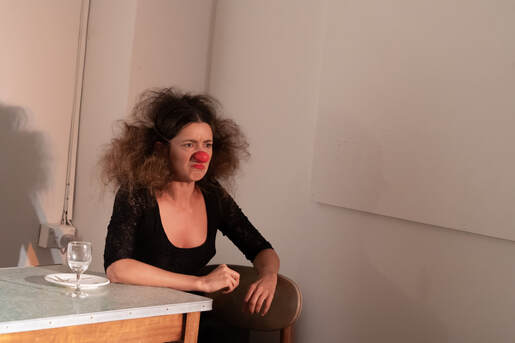
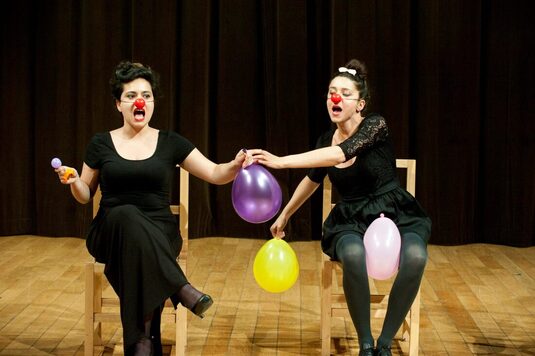
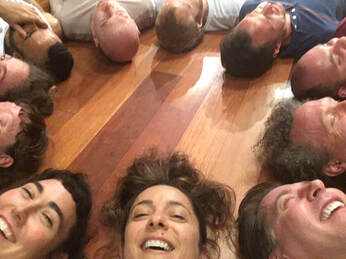
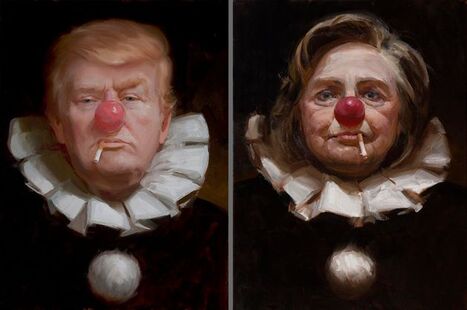
 RSS Feed
RSS Feed
